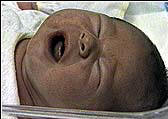![]()
Study traces trauma of Beduin victims of female circumcision
The Jerusalem Post, February 28, 2000, By Patricia Golan
(February 28) - A Ben-Gurion University study on the psychosocial impact of female circumcision among Negev Beduin shows that the women suffer a range of traumatic responses, including difficulties in mother-daughter relationships and trust.
The pilot study was carried out by Rachel Lev-Wiesel and Alean Krenawi, researchers in the BGU Department of Social Work. Twenty-four women were interviewed - 12 who had experienced the ritual and 12 who had not, but who had witnessed or been told about it in their extended families.
The researchers did not examine how widespread the practice is in Israel, nor the precise physical act - which is carried out between the ages of 9-14 - but concentrated on the perceptions of the women who had undergone circumcision, and their emotional reactions to the ritual.
An earlier, even more ..mited study, carried out at Beersheba's Soroka Hospital showed that, unlike in Egypt and other parts of Africa where the clitoris is excised, or even more radical genital mutilation is practiced, among the Negev Beduin the cutting is more symbolic, leaving a small scar.
"This doesn't mean that the girls were not traumatized, particularly those who weren't aware that this was about to happen to them," commented Lev-Wiesel. She said, however, that the women interviewed claimed the act did not harm their sexual functioning.
The subjects of the study were located by word of mouth.
"This is a very secret and very sensitive practice," said Lev-Wiesel. "It is never discussed openly. In most cases it is the mother who pushes her daughter to undergo the circumcision. Often the fathers don't know that this has been done to their daughters."
Some of the girls travel to Gaza for the procedure, where it is reportedly carried out under anesthetic.
According to Lev-Wiesel, one of the most important findings of the study is that the higher the level of education, the more the ritual is perceived as negative and harmful.
The main difference between the two groups of women interviewed, she said, is that those who had undergone circumcision viewed the act as more legitimate than those who had not. "They believed it was a necessary tradition that preserved family purity and honor." Nevertheless, the same subjects described emotional difficulties and a sense of betrayal by their mothers.
The findings were presented yesterday at a conference on "Overcoming Cultural barriers to Women's Health Promotion" organized by the BGU Center for Women's Health Studies.





